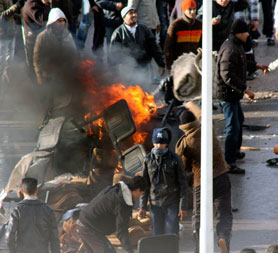Protesters killed in Tunisia unrest
A number of people are killed as angry youths defy a curfew aimed at calming tensions which have caused the worst unrest in Tunisia for decades. Jonathan Rugman reports.
Gunshots were heard in the Tunisian capital city of Tunis as protesters clashed with police in the latest demonstrations which have spread across the country in recent weeks.
Rioters hurled stones at government buildings and trams in defiance, while police opened fire in an attempt to quell the latest clashes following more than three weeks of protests by youths angry at unemployment.
Police are reported to have killed four people overnight after crowds defied a curfew in several towns, opposition members said.
The official number of deaths since violence broke out in December stands at 23, but human rights organisations and witnesses say the true figure is more than 50.
In the provincial town of Sidi Bouzid witnesses said several thousand people had marched through the streets chanting anti-government slogans.
The protests first began after a jobless man set fire to himself after police allegedly confiscated his fruit and vegetable stall because he did not have the correct permit. The 26-year-old died last week.
Those taking part in the protests say they’re angry about unemployment, corruption and what they say is government repression. Officials say the protests have been hijacked by a minority of violent extremists who want to undermine Tunisia.
The UN High Commissioner for Human Rights Navi Pillay, said the deaths were “a result of some excessive measures used, such as snipers (and) the indiscriminate killing of peaceful protesters”.
The government says police have fired only in self-defence when rioters attacked with petrol bombs and sticks. It also says death tolls from rights groups are inflated.

Online battle
The unrest is the biggest challenge to President Zine al-Abidine Ben Ali since he took office 23 years ago. On Wednesday he sacked his interior minister and ordered the release of arrested rioters.
The protests are also being fought online, as Tunisians use social networking to share video, pictures and information.
A number of bloggers have allegedly had email and Facebook accounts hacked, with some being arrested for online ‘activism’.
The loosely-organised group Anonymous – responsible for the Wikileaks-related website attacks – joined the protests by taking down a number of Tunisian government websites last week.
International pressure
Tunisia has come under international pressure over its handling of the protests from the United States and the European Union, its biggest trading partner.
Some analysts say the Tunisian government is likely to be able to contain the unrest, but that in the longer term Ben Ali could find himself weakened and his opponents emboldened.
The protests are being watched closely in other countries in the Arab world with the potential for social unrest, especially after rises in world food prices.
Financial markets have also been alarmed by the unrest in Tunisia, one of the region’s most open economies, which has been attracting steady interest from foreign investors.
Tourism, which accounted for 11 per cent of Tunisia’s hard currency earnings last year, may be especially vulnerable to the unrest. On Thursday the Netherlands issued a statement advising against all non-essential travel to Tunisia.
-
Latest news
-
‘Authentic Stupidity’: Ben Elton’s new show explores how idiotic human beings can be5m

-
Is Israel’s evacuation of Rafah the precursor to full scale invasion?3m

-
Eurovision: Non-binary artist wins for first time2m

-
Tens of thousands march in Georgian capital against ‘foreign agents’ bill2m

-
‘Russia’s number one goal is to get troops closer to Kharkiv,’ says Ukrainian security analyst4m

-




